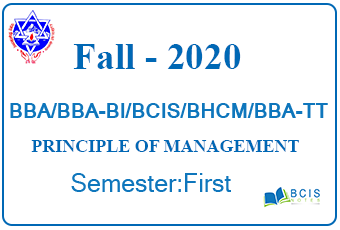
This is the question set along with answers of Principles of Management – Fall 2020, for the first semester which was taken by Pokhara University.
| Level: Bachelor | Semester: Fall | Year: 2020 |
| Program: BBA/BI/BCIS/BHCM/BHM/TT | Full Marks:100 | |
| Course: Principles of Management | Pass Marks:45 | |
| Time: 3hrs | ||
| Candidates are required to give their answers in their own words as far as practicable. |
| The figures in the margin indicate full marks. |
| Section “A” Very short Answer QuestionAttempt all the questions. |
10×2 |
|
| 1. | Define Management. | |
| 2. | Discuss ‘Esprit de crops’ in admirative theory. | |
| 3. | Why is the study of socio-cultural environment crucial in management? | |
| 4. | How do you explain the term staffing? | |
| 5. | What do you mean by job enrichment? | |
| 6. | Give the concept of quality control. | |
| 7. | Give reasons, why is Management by objectives (MBO) gaining importance across organizations. | |
| 8. | Write a short note on organization conflict. | |
| 9. | What is “Corporate social responsibility”? | |
| 10. | What do you mean by organizational change? |
| Section “B” Descriptive Answer question attempt any six-question |
6×10 |
|
| 11. | Explain scientific management. Mention its contribution and limitations. | |
| 12. | Define business environment. Highlight on emerging business environment of Nepal. | |
| 13. | Decision-making is one of the key functions of management. Explain the various condition under which managers make decisions. | |
| 14. | Define the term management? Discuss the differences between groups and terms? Explain the stages of team and group formation with suitable diagrams and examples? | |
| 15. | Define motivation. Critically analyze Maslow’s need hierarchy and Herzberg’s Two-factor theory of motivation. | |
| 16. | What do you mean by organizational design? Describe the basic forms of organizational designs? Explain matrix design with examples? | |
| 17. | Give the meaning of organizational change. State and explain the reasons why managers are reluctant to change. |
| Section “C” Case Analysis Using Social Media for Workplace Communication |
| Theories about communication should provide managers with the tools and information necessary to be able to communicate more effectively and efficiently with the members of the staff and avoid miscommunication.
However, there are numerous cases where the intended message has not been received by staff or customers in the way it was intended. With the advent of social media, managers and businesses have new opportunities and methods to communicate with staff and customers. At the same time, messages that is transmitted via social media can lead to instances of miscommunication and confusion amongst the recipients, with many often questioning whether managers have used the most appropriate channel of commination. For instance—
Questions: a) Based on the two examples from the case, what do you think are the main communication issues? Did the managers of these organizations communicate effectively? Why or why not? b) How would you feel if you were working in these organizations and were affected by such miscomputation through social media platforms? c) What would you do differently if you were a manager for the companies mentioned in the examples? d) What do you think other managers should learn from these examples of miscommunication? |
You may also like: Pokhara University || Mathematics-I Fall 2019 || BBA\BCIS
Do follow Us:bcisnotes

Leave a Reply